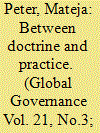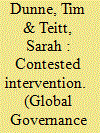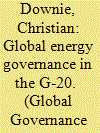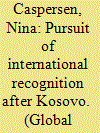|
|
|
Sort Order |
|
|
|
Items / Page
|
|
|
|
|
|
|
| Srl | Item |
| 1 |
ID:
140414


|
|
|
|
|
| Summary/Abstract |
Mandates of recent peacekeeping operations across Africa have shown substantial innovation in the thinking of the UN Security Council. Offensive use of force, use of unmanned aerial vehicles, strategic intelligence and communication, and state-building mandates in the midst of conflicts have all expanded the scope of activities beyond what the UN peacekeepers are accustomed to. The UN is entering a new era of enforcement peacekeeping. Enforcement peacekeeping manifests itself both in enforcement of political solutions through support of a government's state-building ambitions and its attempts to extend state authority in the midst of conflict and in enforcement of military victories through the offensive use of force. These developments further unsettle the basic principles of UN peacekeeping—consent, impartiality, and nonuse of force—resulting in a schism between the doctrine and practice. This contribution argues that such fundamental challenges, when not properly acknowledged, create a wall between operational activities and strategic considerations. They preclude a proper debate on the problematic externalities, in particular on political processes and peacebuilding.
|
|
|
|
|
|
|
|
|
|
|
|
|
|
|
|
| 2 |
ID:
140418


|
|
|
|
|
| Summary/Abstract |
Existing debates suggest that small states can exert more influence than their size alone implies. This article contributes to such extant literature by addressing more specific questions about the conditions under which such ostensible price takers can play outsized roles. Generic claims of tiny Singapore punching above its weight have not yet been examined in light of its leaders' proactive initiatives in global governance to advance its national interests. Drawing on two strategies identified within theoretical debates on how small states project influence, this article analyzes Singaporean initiatives in coalition building and use of its comparative advantages in specific issue domains and how these strategies have evolved historically. Driven by an innate sense of vulnerability, Singapore's flexibility to embrace emerging modes of governance beyond its traditional UN-centric focus is a relatively overlooked feature in the literature deserving further attention.
|
|
|
|
|
|
|
|
|
|
|
|
|
|
|
|
| 3 |
ID:
140417


|
|
|
|
|
| Summary/Abstract |
Three decades of financial crises culminating in the global financial crisis have prompted the development of multilayered global financial governance. This article examines the relationship between the global and regional layers by analyzing the case of the global and ASEAN+3 financial safety nets. Making use of regime theory, we examine the evolution of the characteristics, main institutions, goals, and behavioral expectations of these two nets. The article argues that the ASEAN+3 regional financial safety net, which was mostly developed following the East Asian financial crisis of 1997, complements rather than undermines the global financial safety net. Similar characteristics, goals, and behavioral expectations underpin this complementarity.
|
|
|
|
|
|
|
|
|
|
|
|
|
|
|
|
| 4 |
ID:
140415


|
|
|
|
|
| Summary/Abstract |
This article examines institutional patterns of leadership and followership in the UN Security Council with respect to the Responsibility to Protect principle. In a departure from existing literature on leadership and followership in international relations, which has hitherto been framed within a realist analysis, the article presents a constructivist account of leadership that sheds light on the strategies and scope of conditions for mobilizing international action to protect populations from mass atrocities. The article applies a theoretical innovation to case studies that examine strategies that India and China adopted in the Security Council to respond to the crises in Libya and Syria from 2011 to 2013. This integration of theory and empirics reveals a complex and layered account of factors that shape the Security Council's ability to exercise its Responsibility to Protect. In doing so, the article demonstrates that followership and leadership are relational practices that create or limit the possibilities for institutional action.
|
|
|
|
|
|
|
|
|
|
|
|
|
|
|
|
| 5 |
ID:
140420


|
|
|
|
|
| Summary/Abstract |
There is an emerging consensus among global governance scholars that there is a global energy governance gap. The rapid transformation of global energy markets with a new cast of producers and consumers, which now accounts for two-thirds of global greenhouse gas emissions, has left the existing institutional architecture behind. While there has been some discussion in the emerging literature on the potential role of the Group of 20, there is almost no analysis of what conditions need to be met for the G-20 to act in a significant fashion. This article takes up this task. Drawing on recent scholarship in global governance, environmental politics, and international negotiations, as well as the observations of the author who is a past delegate to G-20 negotiations, it considers the role of the G-20 in global energy governance and identifies the principal conditions that will need to be met if the G-20 is to drive more than piecemeal change.
|
|
|
|
|
|
|
|
|
|
|
|
|
|
|
|
| 6 |
ID:
140416


|
|
|
|
|
| Summary/Abstract |
The international recognition of Kosovo exacerbated existing uncertainties over state recognition. By its supporters it was billed as a “unique case,” but others saw it as extending the right to self-determination. Unlike most literature on state recognition, this article adopts a bottom-up approach and analyzes how other aspiring states have reacted to the new politics of recognition. Drawing on the legitimation strategies observed in five de facto states since 2008, it argues that separatist strategies are not simply shaped by changes in the practice and norms of state recognition. They are constrained, both internally and externally. While there is greater divergence in official strategies since 2008 and a greater emphasis on international engagement, the substance of the strategies is much more homogenous and demonstrates a great deal of continuity.
|
|
|
|
|
|
|
|
|
|
|
|
|
|
|
|
| 7 |
ID:
140419


|
|
|
|
|
| Summary/Abstract |
How do rising powers engage in norms entrepreneurship on issues of global relevance? This article analyzes Brazil's efforts to mobilize support for international regulation of electronic espionage. More specifically, the article examines Brazil's reframing of electronic espionage as an issue of development and human rights (rather than merely a security one) as part of an effort to trigger a norms cascade that would significantly modify what is viewed as acceptable use of the Internet by state agencies. Through this reframing, Brazil has begun to push for broader Internet governance reform as a prerequisite for curbing electronic espionage. In assuming the role of norms entrepreneur, Brazil incurs both opportunities and risks to its role and image as an innovative multilateralist.
|
|
|
|
|
|
|
|
|
|
|
|
|
|
|
|
|
|
|
|
|